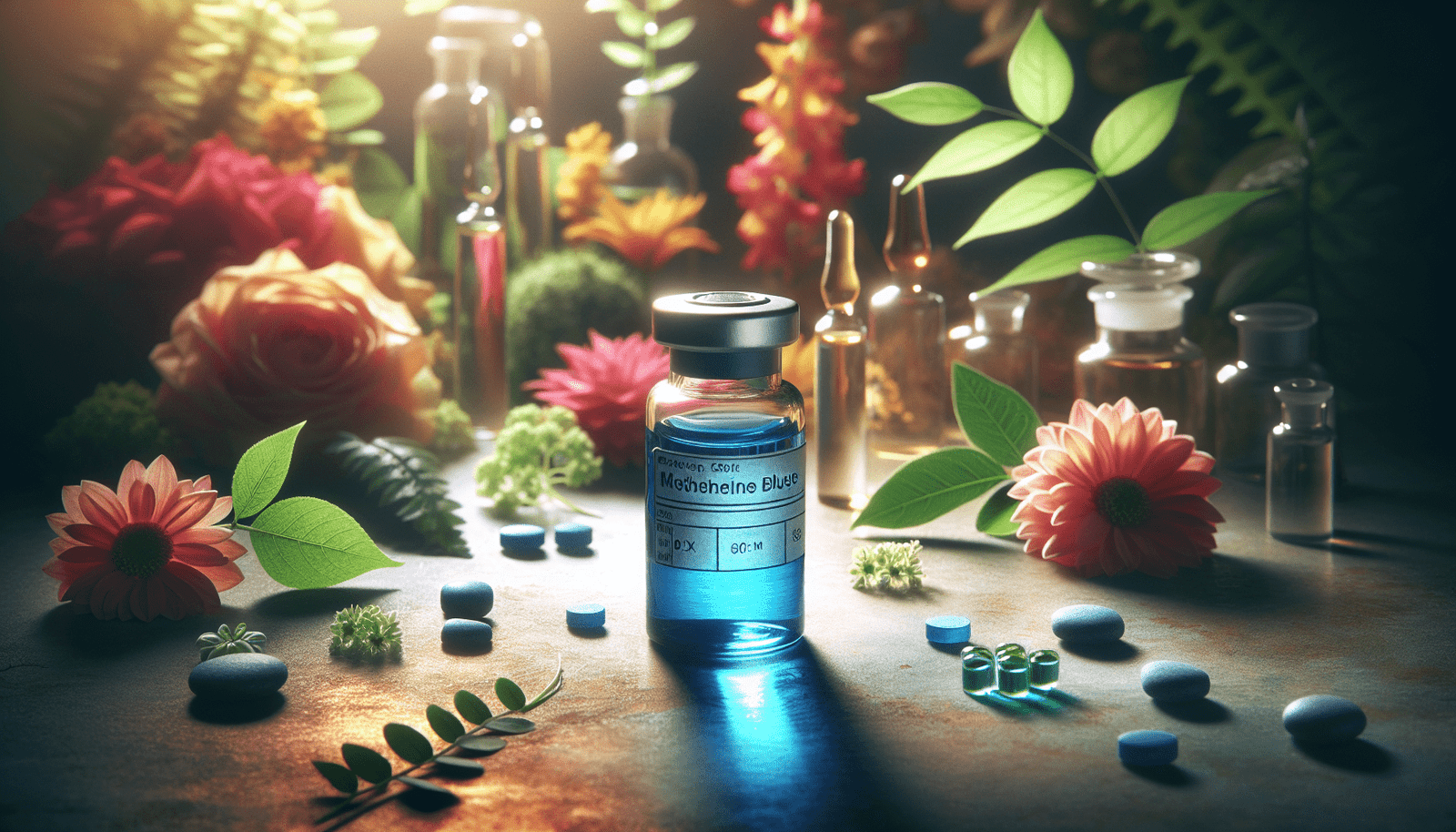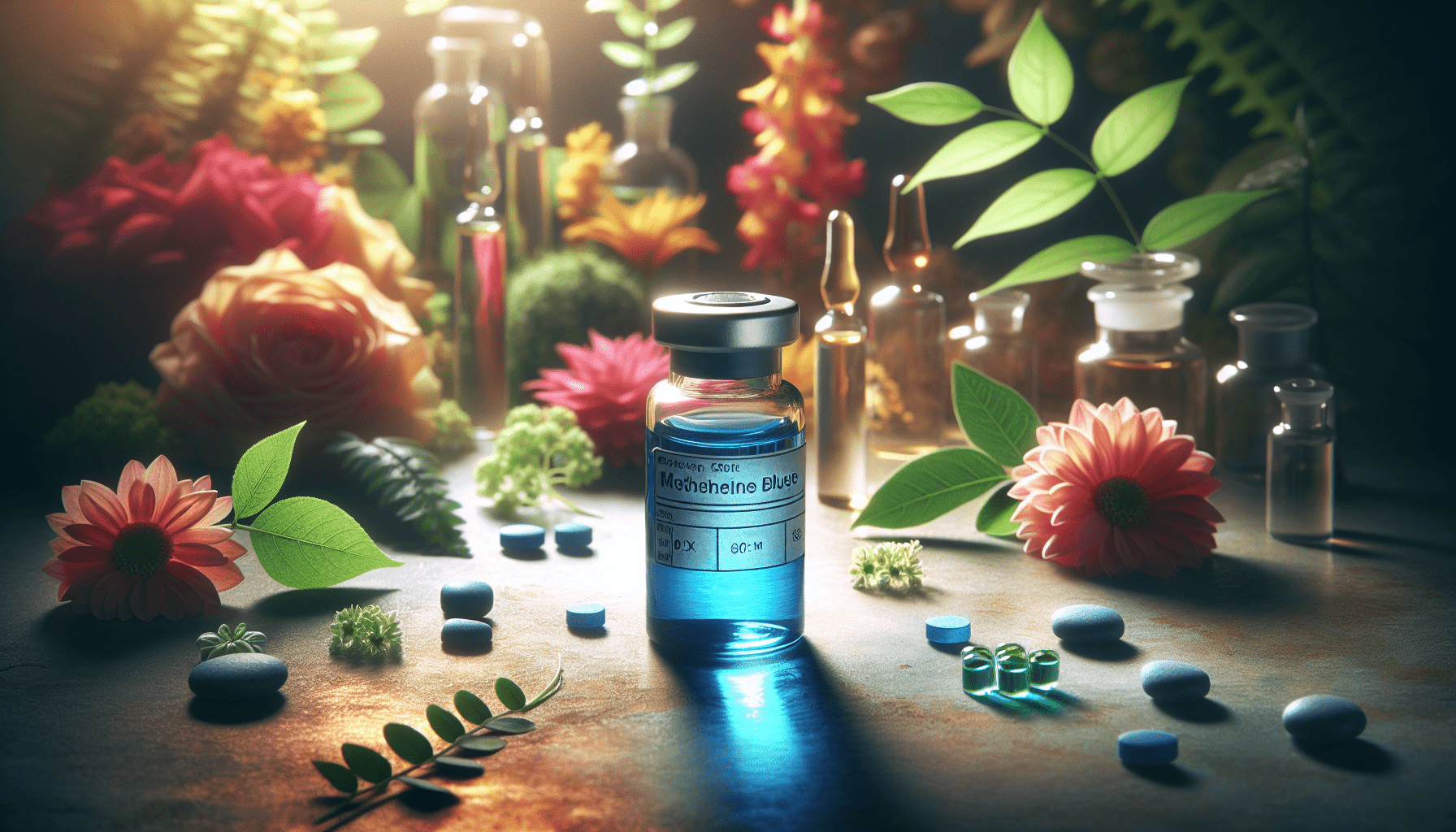
Is it possible that something as simple as a dye could hold the key to an anti-aging miracle? Many people are on the lookout for the next big thing in skincare and longevity, and the spotlight has recently shifted to methylene blue. You may have come across this bright blue solution in discussions about health, science, or even as a potential remedy for ailments. But could it actually work as an anti-aging agent?

What is Methylene Blue?
Let’s start from the beginning. Methylene blue is an organic compound that’s been around since the late 19th century. Originally used as a dye and a treatment for malaria, it has since found various applications in fields like biology and medicine. It’s interesting that a chemical once used to color fabrics now garners interest for its potential health benefits.
Originally, methylene blue has been employed in treating conditions such as methemoglobinemia (a blood disorder) and urinary tract infections. But what about its role in the realm of aging?
How Does Methylene Blue Work?
Methylene blue works primarily by acting as an electron carrier in cellular respiration, which is crucial for energy production in your cells. To put it simply, it helps your cells utilize oxygen more efficiently.
Imagine your cells as little factories. In order to keep them functioning well, they need a constant supply of energy. Methylene blue acts like a worker in this factory, helping to ensure the machines run smoothly and that everything is operating at peak efficiency.
Antioxidant Properties
One of the hallmarks of aging is the accumulation of oxidative stress, which damages cells over time. The good news is that methylene blue has been shown to possess antioxidant properties, meaning it can neutralize these damaging free radicals.
These protective abilities don’t just stop at stopping damage; they may also support the repair of your cells. By reducing oxidative stress, methylene blue could play a significant role in promoting longevity.
Neuroprotective Effects
Research has suggested that methylene blue has neuroprotective effects as well. It has shown promise in various neurological conditions, such as Alzheimer’s disease and Parkinson’s disease. Although we may not often think about brain health in terms of aging, cognitive decline is a significant concern as we grow older.
Methylene blue appears to improve mitochondrial function in the brain. Mitochondria are the energy producers of your cells, including those in your brain. When these cellular powerhouses are functioning correctly, you’re more likely to maintain cognitive function as you age.
The Science Behind Aging
Before we get too deep into the anti-aging claims, it’s essential to understand the science of aging. Aging is a complex process influenced by various factors, including genetics, environment, and lifestyle choices. In scientific terms, aging is often associated with cellular senescence, telomere shortening, and mitochondrial dysfunction.
Cellular Senescence
Cellular senescence refers to the state where cells lose the ability to proliferate. Instead of doing their job, these cells can become a source of inflammation and other issues that contribute to aging.
When you think about it, it’s like having a team of workers at a factory who refuse to do their jobs anymore. Methylene blue steps in by promoting cell health and may reduce the rate of cellular senescence.
Telomere Shortening
Telomeres are the protective caps on the ends of chromosomes, and they play a vital role in aging. With each cell division, your telomeres shorten, which can eventually lead to cell death when they become too short.
Some studies suggest that methylene blue might help in maintaining telomere length, thus supporting healthy cell replication. If telomeres can stay functional longer, you may experience fewer age-related issues.
Mitochondrial Dysfunction
Mitochondrial dysfunction is another critical factor in aging. As discussed earlier, mitochondria are responsible for energy production. Over time, their efficiency decreases, leading to reduced energy and increased oxidative stress.
Methylene blue’s ability to enhance mitochondrial activity could help counteract these effects. Think of it as providing your mitochondria with a little pep talk to get back to work and keep energy levels up.
Methylene Blue in Anti-Aging Treatments
So, how does methylene blue fit into the realm of skincare and anti-aging treatments? There’s more to it than just ingesting a bright blue liquid.
Topical Application
Some skincare brands have started incorporating methylene blue into their formulations. The logic is that if it works well at the cellular level, applying it topically might provide skin benefits too.
In essence, using methylene blue in serums or creams could potentially help fight off the signs of aging, such as fine lines and wrinkles. By supporting cellular function, these products aim to keep your skin looking youthful and vibrant.
Ingesting Methylene Blue
There are those who advocate for the ingestion of methylene blue, suggesting it could promote overall health and longevity. However, it’s crucial to tread carefully here. The idea is still very much in its infancy, and there aren’t extensive studies backing its safety and efficacy when taken orally.
Dosage and Safety
If you’re considering trying methylene blue for anti-aging purposes, it’s essential to discuss it with a healthcare professional. Methylene blue can interact with other medications and shouldn’t be taken lightly.
While the potential for health benefits is exciting, overdoing it could lead to some unwanted side effects.
Potential Risks and Side Effects
Like any substance, methylene blue is not without its risks. Understanding these risks is essential if you’re considering it as part of your anti-aging regimen.
Common Side Effects
Some of the side effects of methylene blue can include:
| Side Effects | Description |
|---|---|
| Nausea | Some people may experience stomach discomfort. |
| Headaches | Headaches are a common complaint among new users. |
| Dizziness | A feeling of light-headedness can occur. |
| Urine Discoloration | Expect a noticeable blue tint to your urine. |
You may find it surprising that something used in medicine can have such unusual side effects.
Serious Risks
Although rare, methylene blue can cause more severe reactions, such as:
-
Serotonin Syndrome: If you take medications that affect serotonin, combining these with methylene blue could lead to dangerously high levels of serotonin.
-
Allergic Reactions: Some individuals may experience allergic reactions leading to rashes, itching, or other serious symptoms.
Given these potential risks, it’s vital to have an open conversation with your healthcare provider before trying methylene blue, especially for anti-aging concerns.

The Future of Methylene Blue Research
The research surrounding methylene blue and its applications in anti-aging and longevity is quite fascinating and still evolving. While some studies show promise, we are far from definitive conclusions.
Clinical Trials
You may be wondering what’s next in the world of methylene blue research. Clinical trials are crucial for establishing safety and effectiveness. As interest grows, we can expect more structured studies assessing its impact on aging.
Potential for Combination Therapies
Another area of research to watch is the possibility of combining methylene blue with other compounds. With growing knowledge around regenerative medicine, a multi-pronged approach could prove beneficial for enhancing longevity.
Technological Advancements
Lastly, technological advancements in drug delivery systems mean that the way we ingest or apply methylene blue may soon change. More effective and safer delivery methods could help maximize its potential.
Conclusion: A Methylene Blue Future?
So, is methylene blue an anti-aging miracle? While it shows potential, it’s crucial to approach it with cautious optimism. The science surrounding methylene blue is ongoing, with emerging studies paving the way for potential breakthroughs in the coming years.
As you ponder adding methylene blue to your anti-aging regimen, remember that there’s no one-size-fits-all answer when it comes to skincare and health. A balanced approach, which includes a healthy diet, consistent exercise, and adequate skincare, is likely your best bet in maintaining youthful skin and vitality.
You’re on a journey toward understanding more about the potential of methylene blue, and while it may not have all the answers right now, keeping an eye on the latest research means you can make informed decisions. Stay curious, but also stay safe as you navigate the world of aging gracefully.